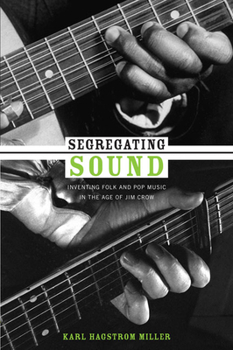Segregating Sound: Inventing Folk and Pop Music in the Age of Jim Crow
(Part of the Refiguring American Music Series and Refiguring American Music Series)
Select Format
Select Condition 
Book Overview
In a cultural history filled with musicians, listeners, scholars, and business people, Miller describes how folklore studies and the music industry helped to create a "musical color line," a cultural parallel to the physical color line that came to define the Jim Crow South. Segregated sound emerged slowly through the interactions of southern and northern musicians, record companies that sought to penetrate new markets across the South and the globe, and academic folklorists who attempted to tap southern music for evidence about the history of human civilization. Contending that people's musical worlds were defined less by who they were than by the music that they heard, Miller challenges assumptions about the relation of race, music, and the market.





